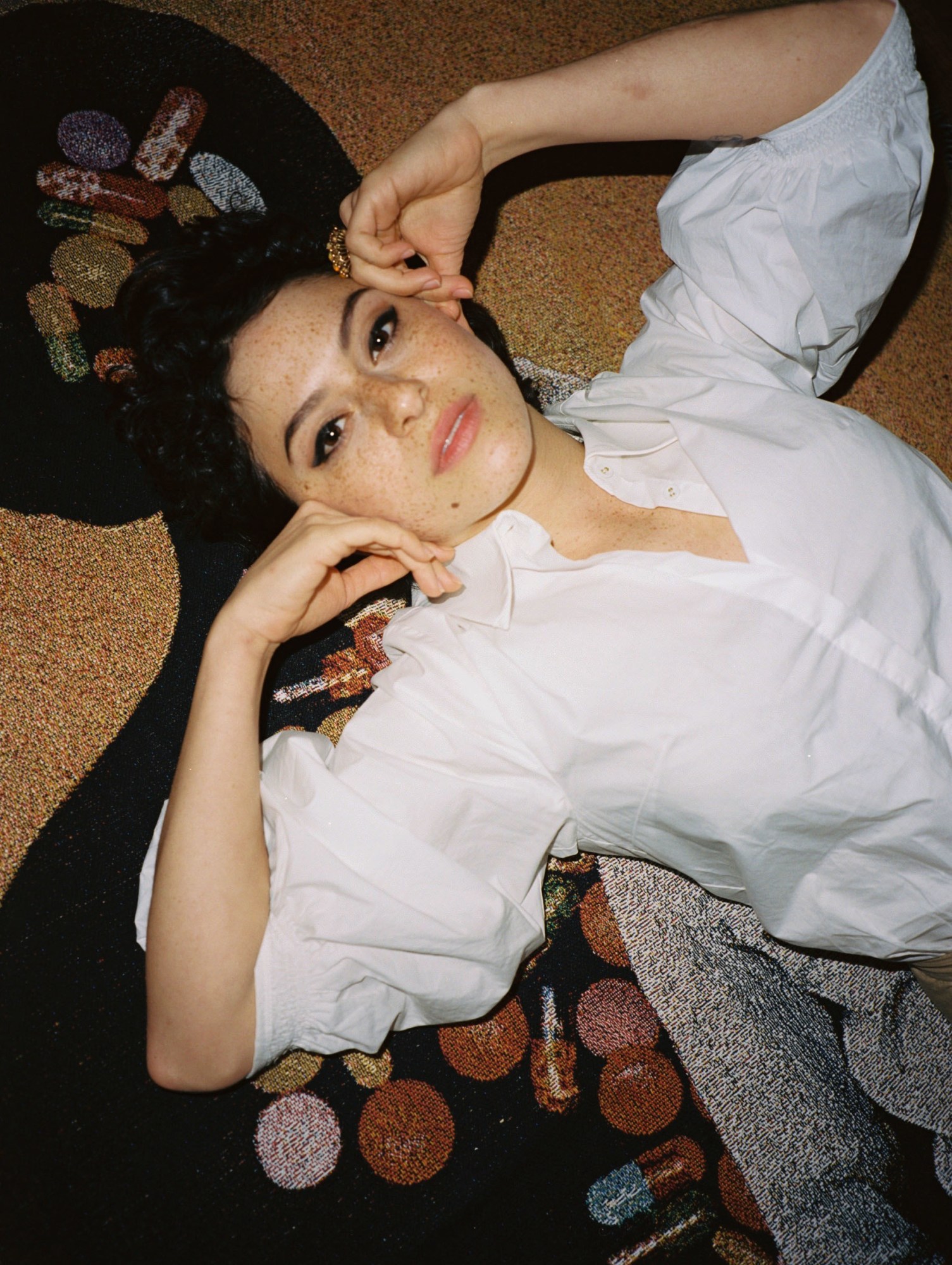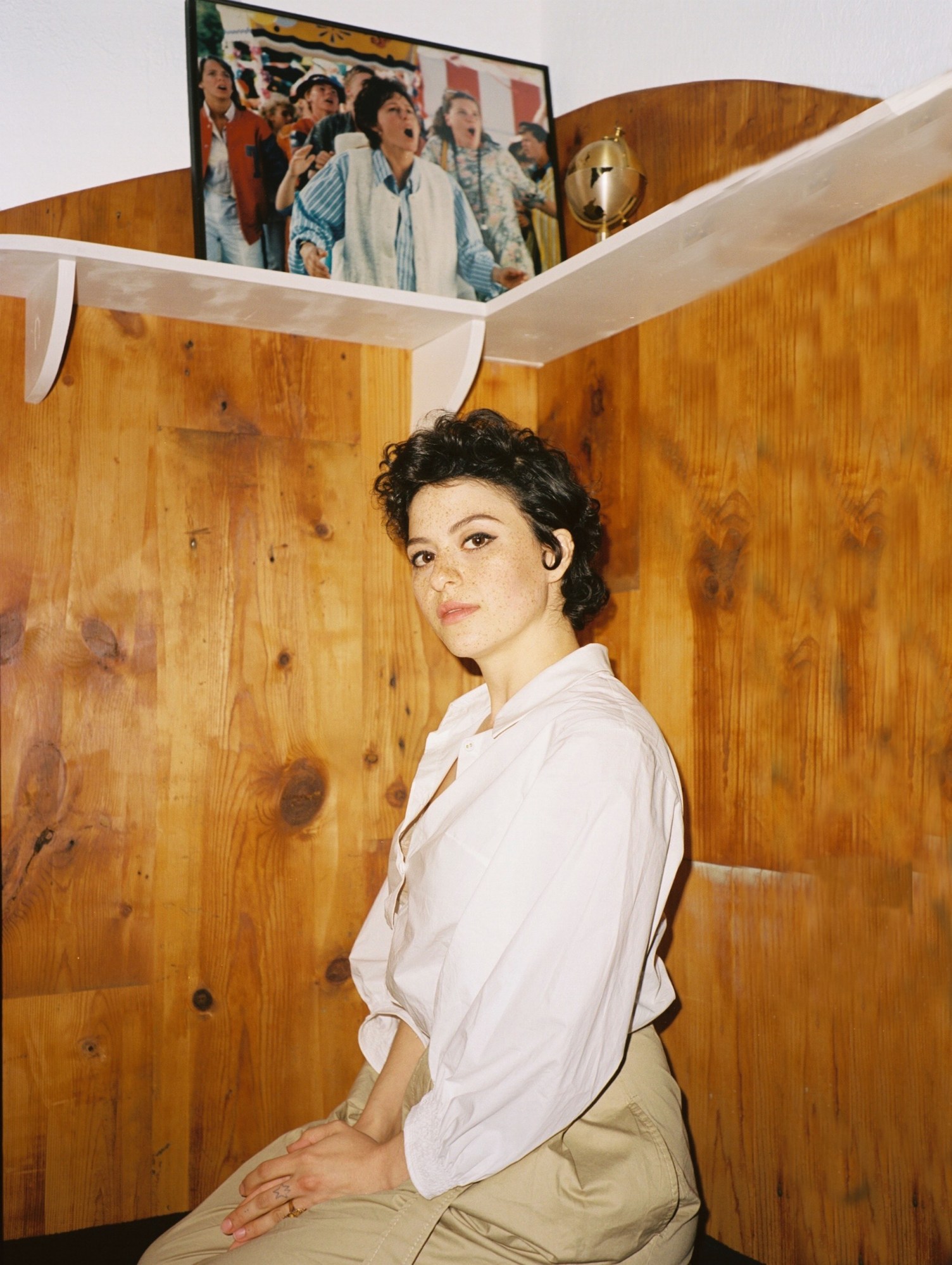All That, Nickelodeon’s TLC-soundtracked Saturday Night Live for kids, launched the careers of cast members Amanda Bynes and Kel Mitchell. It also indirectly launched the career of Alia Shawkat, who watched the show as a child in the 90s and thought, I can do that. At nine, the future star of Arrested Development told her parents she wanted to be on television. After watching TV day and night at home in Palm Springs, she felt ready. “I had a lot more confidence then than I do now,” she says today.
For the many, many fans of Mitchell Hurwitz’s cult comedy Arrested Development, Alia is inseparable from her character Maeby Fünke. She’s the deadpan voice of reason in the middle of a ridiculous circus. But since the show’s first wrap in 2006, she’s been assuming a more central role in pop culture: in a hilarious guest turn as Ilana’s doppelganger lover on Broad City, as a singer, as an activist, and now as the star of the new mystery sitcom Search Party, which is between its first and second seasons. The show is a delicately ironic satire about life as a twenty-something in Brooklyn that could have easily gotten lost somewhere on the G train between Girls and High Maintenance, but redeems itself with a nearly perfect attention to episode structure and narrative arc. It’s compulsively watchable television, with Alia front and center as the sad sleuth Dory Stewart.
As we chat over the phone I flip through photos of the previous weekend’s Women’s March on Washington, and there’s Alia, with a Venus symbol painted on her freckled face and a scarf on her head.
What was the Women’s March on Washington like for you?
It was unbelievable. I’m still dreaming about it. I was nervous and excited, and then when I actually got there it exceeded my expectations of what people could do. Just being around that many people who were so connected, I don’t think I’ve ever been in a group like that. That collective consciousness of everybody, it was like a drug, it was crazy. I wanted it to last forever and then I was so tired. I want there to be a yearly thing. I’ve been feeling, for lack of a better word, raw emotionally. Every day my New York Times notifier thing is just letting me know more heartbreaking news every second. I just have to remind myself that other people are doing the same thing, and we have to carry that energy, that kind of intangible thing that was there, into our daily lives as we move forwards.
In light of Meryl Streep’s Golden Globes speech, what do you think an actor or artist’s obligations are during this unprecedented political climate?
I was just talking about this last night because I’m going to be presenting at the SAG Awards and I remember thinking, It’s so strange, it’s always been kind of separate. Some people have politicized the platform but it wasn’t really the cool thing to do. Now I feel like actors aren’t even representing just the liberal stance, it’s more like basic human rights, and also what is America made up of and what is our community made up of? People who are from all different parts of the world, men and women, people who are homosexual, transgender. So I think it’s kind of scary but at the same time it’s like, do I have to comment on something? It’s always felt more personal, like everyone has their own kind of thing. But now it’s gotten to the point where everybody has to comment on what’s happening in the air, it’s your job as an artist.

Which issue among all of the issues that we’re collectively protesting is the most vital for you?
Women’s rights and Islamophobia. Planned Parenthood, the fact that women’s health rights are being challenged again is incomprehensible. Islamophobia — my father is from Baghdad, I was raised in a Muslim-American family, and it’s always been an issue slowly creeping, and now the place that it’s reached, it’s really important to stick together. Any kind of religious freedom that can be challenged in the states is so mind boggling and confusing. Young women is the audience that I speak to, and what I hope to do in the future is to reach out to young girls to regain a focus and a confidence in women.
Do you think that this political climate will change the way that you choose projects?
Yes. Not only choose but make projects. Everything nationally has a different filter now. It’s not necessarily referring to [Trump] or referring to what’s actually happening, it’s just there’s a different weight to everything. That’s just what happens. It’s definitely going to affect the projects I do, and not even the themes specifically but the way to carry them out which I think is true art, like a form of poetry.
The second season of Search Party is being written now. Will it address some of this political unease we’ve been discussing?
Yeah. When I was in the writer’s room yesterday we were all just talking about overall themes and I think that the first season is already naturally politicized. It has more of a comment than we intentionally meant, because when we wrote it, things weren’t this dire. Season one shows examples of people who are so inside their own world and have such an apathy for things outside of themselves that they literally can destroy someone else’s life and their own. How living inside this plastic bubble of privilege, whether you’re wealthy or not, just social privilege, the idea of a hipster, is a lot more dangerous than it’s ever been before. So I think those themes were strong in the first one and definitely will carry on.
Well, the main character is searching for a lost girl but she’s also searching for herself. Do you identify with that ongoing search for self? Or do you feel more solid in your identity?
I think we’re always kind of searching for identity. Since I’ve been acting so long, what I spend a lot of my time doing is traveling, building a new person and meeting a whole new group of people in a different city. So in a way, I lose myself and find it again. That’s part of my meditative experience. I like to absorb it and release, absorb it and release. So I think I have a stronger sense of myself than Dory does, for sure, but it’s almost like I crave to change mine a lot. That’s what makes me feel more honest with it than finding one to stick to.
It seems like the perfect mindset for an actor.
That’s why I act, that’s why I like to do that, it’s a form of escapism, but I also realize that it’s nothing permanent. I don’t think anything is, we just have to keep reminding ourselves that nothing is.
You spoke about the characters in Search Party being in this sort of liberal bubble. Do you feel connected to that sort of twenty-something Williamsburg hipsterdom?
I’m 27 now. I remember staying when I was 21 for a summer in Williamsburg with my friends when it was really popping off and all these people were coming there. I can’t believe I said “popping off.” But everything was a barbecue, or free ice cream, it just felt ridiculous, like a kid’s playground. I definitely had a summer where I embraced that. I mean, I’m definitely in that environment to a degree, dressing in vintage clothes, and I like nice coffees and stuff, but I’m lucky that I have an opportunity to have different perspectives. So all of a sudden I’m in, like, a small town in Louisiana for two months, or in Romania, or staying with my family in Palm Springs, or I’m in Texas visiting a friend. I think that’s the only danger of it, is thinking those creature comforts are the only thing.
Do you feel a sense of pressure in being such an anchor to the show and really having to carry the narrative? Contrasted with Arrested Development, where it was such an ensemble.
Yes. Definitely. When I get stoned and I’m alone in my house, I’m like, Why the fuck am I an actor? Why am I doing all of this? Why do I want all this attention for no reason? But no, I really enjoy it. I was younger on Arrested Development, and also it was a different focus of my life, acting. I enjoyed it but I was a teenager, and when I finished it I moved to New York and didn’t work for a while, and I kind of lost my passion for it. I was so lucky to do such a good show, but it was such a different kind of thing. As I got older, like the last five years, I was like, Oh, I really do want to do this and if I’m going to do it I’m going to do it full on. The projects I’ve been doing for the last five years, I’m very proud of, I really love them, and I’m a lot more involved. When Search Party came along it was really the perfect mix of those things. One created the other, the synergy of it, being ready for it and wanting to do it.
Credits
Text Rory Satran
Photography Grace Pickering
